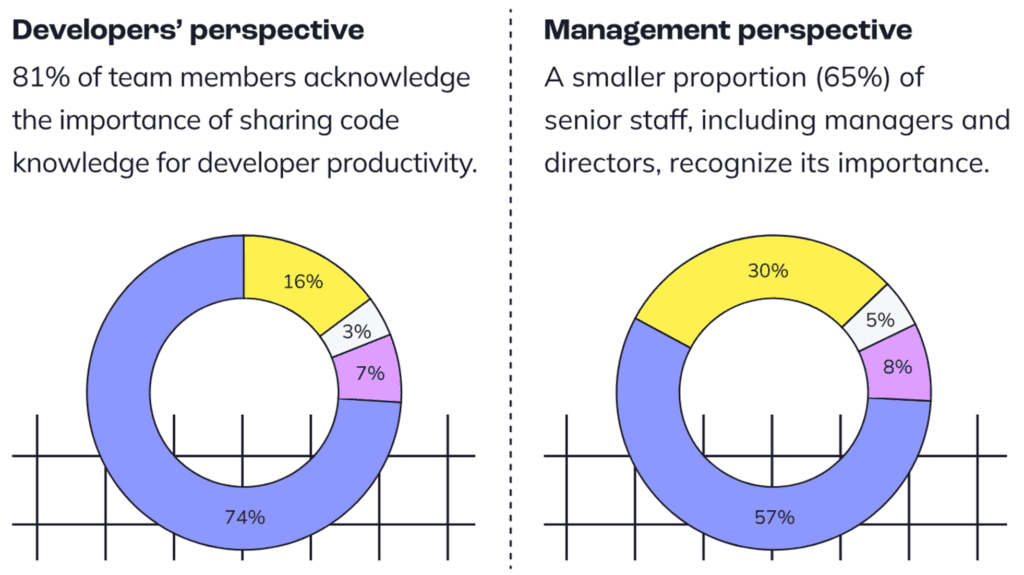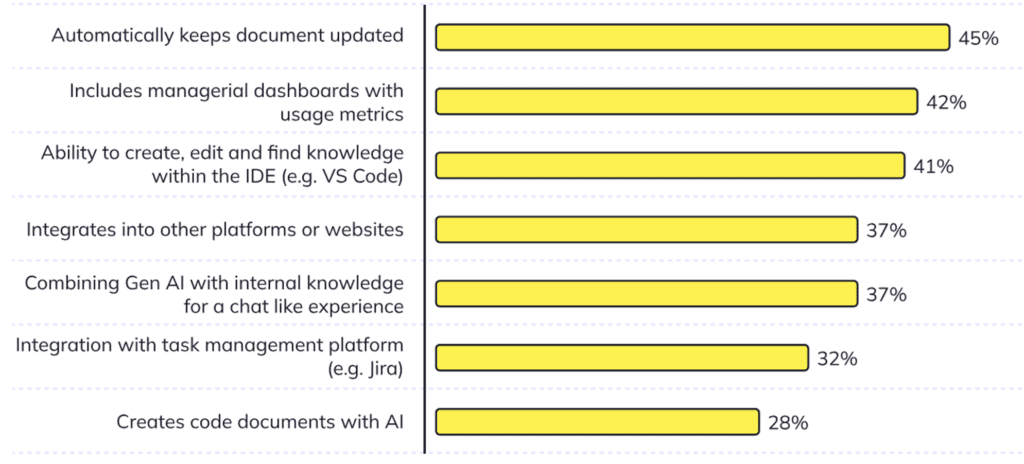As AI coding tools become ubiquitous, with 92% of developers using or experimenting with them, the importance of understanding code remains critical. Whether code is written by humans or generated by AI, it still requires comprehension by future developers or managers. Investments in making code easier to understand are key to sustaining or boosting developer velocity. Swimm conducted a survey (demographics and methods covered at the end of this blog) to highlight ‘the challenges and benefits of code knowledge sharing.’ It ultimately revealed the ‘need to provide developers with the best tools and solutions for navigating and understanding complex codebases’.
In this article, we provide a quick overview, and strongly encourage you to see the full results of the survey here:
Link to Swimm’s ‘ The State of Developer Knowledge Sharing 2024’
Key Findings:
1. Understanding Code Boosts Productivity:
73% of developers believe that understanding and sharing code knowledge can increase their productivity by 50%. This underscores the importance of effective knowledge sharing in accelerating development cycles and enhancing the developer experience.
2. Deficient Knowledge Sharing:
Only 1% of developers think their company excels at sharing code knowledge, and less than half (46%) feel confident in their company’s abilities in this area. This is concerning given the previously mentioned benefits of effective knowledge sharing on productivity.
3. AI Adoption:
99% of organizations are either using or planning to use AI tools for sharing code knowledge, with 30% already employing these tools. AI integration in development workflows is becoming essential.
4. Desired Features in AI Tools:
Key features highlighted by respondents for code knowledge sharing tools include automatic updates for technical sources like internal documentation (45%), dashboards with usage metrics (42%), and the ability to create and discover technical codebase knowledge within the IDE (41%).
5. Tailored Solutions for Knowledge Management:
Developers face similar challenges in sharing technical knowledge, acknowledging its importance for productivity. They struggle to efficiently capture this knowledge, while managers worry about losing insights when key team members leave. Therefore, comprehensive solutions that simplify capturing and preserving technical knowledge are essential.
Further Details:
Developer Productivity: Expectation vs. Reality
There is a gap between developers and management in understanding the importance of code knowledge sharing. While 81% of developers see it as crucial for productivity, only 65% of senior staff agree. This disparity suggests a need for better communication and engagement between managers and developers.

Developer Productivity: Expectation vs Reality Source: The State of Developer Knowledge Sharing (Swimm.io)
Developer Questions Are a Major Time Usage
The majority of both developers (94%) and managers (97%) spend a significant amount of time (4.9 hours/week on average) answering questions about code. This time increases with company size, as larger codebases and more complex systems demand more effort to understand, accumulating to approximately 10% of their week answering these questions.
Improving Developer Productivity by >50%
Effective knowledge sharing can improve delivery velocity by over 50%.

Impact on delivery velocity by seniority Source: The State of Developer Knowledge Sharing (Swimm.io)
However, there is a notable difference in perspective between developers (73%) and managers (81%). This makes sense as managers, who tend to have a better overview of the overall ‘picture’ might have better understanding of how effective knowledge sharing can improve velocity of the whole team.
Developers Struggle with Documentation
Developers face several challenges with documentation:
- Hard to Create: 45%
- Team Resistance: 45%
- Out of Date: 44%
Whereas ‘Developers find it hard to capture and use sources of technical knowledge’, Managers’ main concerns are about knowledge loss when employees leave and the time senior engineers spend answering questions.
The top 3 management challenges are:
- Losing critical knowledge when employees leave (45%)
- The people with the knowledge spend too much time answering questions (43%)
- Code documentation is hard to create (35%)
This emphasises the importance of setting up a system that facilitates knowledge sharing that is easy and intuitive to use, and gets used by developers.
Investing in Knowledge Sharing Pays Dividends
Key benefits of effective knowledge sharing include:
- Quicker and easier refactoring or changing of infrastructure (39%)
- Faster incident response (38%)
- Promotion of best practices (38%)
Organizational Toll of Ineffective Knowledge Sharing
Poor knowledge sharing leads to:
- Longer time to fix critical issues (53%)
- Code quality issues (46%)
- Reduced team productivity (37%)
AI Adoption
Nearly a third of companies are already using AI tools for knowledge sharing, with almost half planning to adopt these tools within the next year. The integration of AI into the software development lifecycle is essential for staying competitive.
What Developers Look for in a Knowledge Sharing Tool
Developers prioritize:
- Automatic updates for documentation (45%)
- Managerial dashboards with usage metrics (42%)
- Integration within the IDE (41%)

What do developers look for in a knowledge sharing tool Source: The Stater of Developer Knowledge Sharing 2024 (Swimm.io)
Conclusion
Effective knowledge sharing is critical for maintaining productivity and managing complex codebases. AI-powered tools provide a powerful means to enhance knowledge sharing practices, and organizations need to adopt these tools to stay competitive.
Demographics
The survey included 200 full-time software engineers and senior managers from companies with over 75 developers, across various industries in the United States.
Methodology
The survey was conducted online by Global Surveyz on behalf of Swimm in November 2023, involving 200 participants from various industries in the United States.
For a detailed understanding and more insights, please refer to the full report by Swimm.io (link in the introduction).



